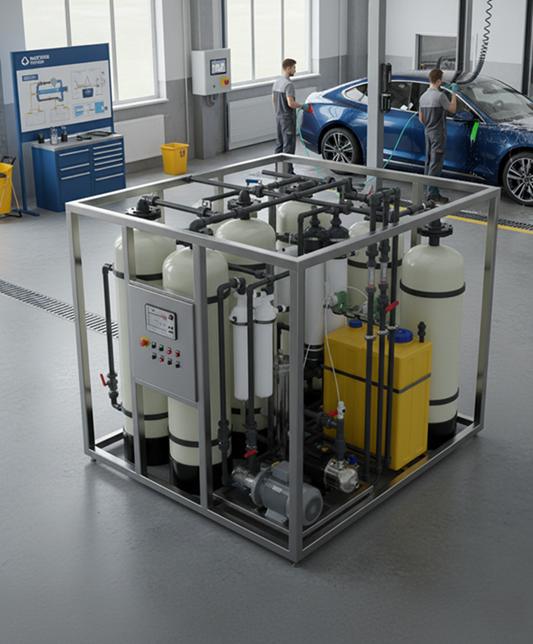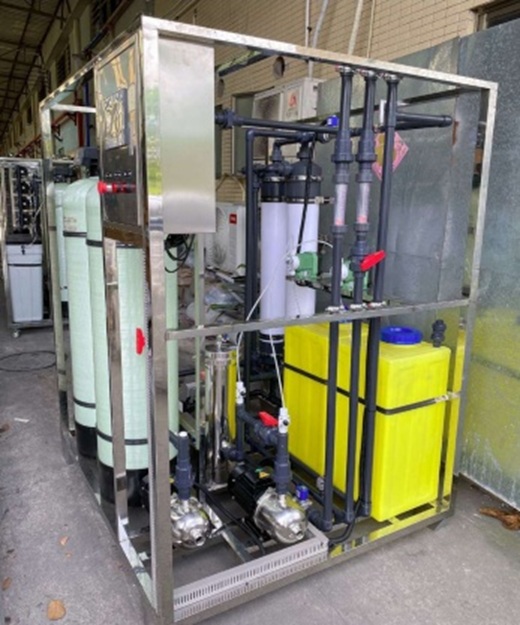
Regulatory Compliance and Innovative Technologies in Wastewater Management in Auto Service Centers
In the context of auto service centers, the adoption of water recycling systems has gained momentum in response to increasing regulatory pressure and environmental concerns. As car wash companies recognize the significant impact of wastewater discharge on the environment, the need for efficient water reuse systems has emerged.
By implementing these systems, car washes are not only able to comply with stringent wastewater management regulations but also promote sustainable practices in their operations.
Regulatory Milestones and Innovations
Regulatory frameworks have played a crucial role in shaping the development of water recycling systems in auto service facilities. Several regulations, including the Clean Water Act, impose strict guidelines on wastewater discharge.
These regulations have motivated the automotive industry to explore innovative water recycling technologies that treat and reuse water effectively, reducing overall consumption and environmental impact. Furthermore, with growing public awareness of environmental sustainability. Auto service centers have increasingly adopted eco-friendly practices to enhance their brand reputation and customer confidence. This shift reflects a broader trend in the automotive industry toward re-evaluating resource consumption, driven by regulatory compliance and consumer expectations for sustainable operations.
Implementation in Auto Service Centers
Water recycling systems play a critical role in auto service centers by enhancing operational efficiency and promoting environmental sustainability. These systems are designed to treat and reuse wastewater generated from various vehicle maintenance operations, reducing overall water consumption and minimizing the environmental impact of auto repair activities.
Read also: Water Recycling Plants in Auto Service Centers
The Importance of Selecting Key Components for Water Recycling Systems
Effective implementation of water recycling systems requires compliance with regulations and industry standards. Auto service centers must select systems with the necessary approvals to ensure compliance with local water authority regulations. These systems often incorporate advanced treatment technologies capable of handling the specific characteristics of wastewater generated from car washes, repairs, and auto parts maintenance.
Equipment and Maintenance
The reliability of water treatment systems is essential to ensure continuous operations. It is essential that the selected components are durable and easy to maintain. Regular maintenance and monitoring are critical to ensuring the effectiveness of these systems and minimizing downtime.
The Environmental Impact of Water Recycling Stations in Auto Service Centers
By adopting water recycling systems, auto service centers can significantly reduce their environmental footprint. These systems conserve valuable water resources, reduce hazardous waste generation, and support the overall sustainability goals of the automotive industry.
In addition, using recycled water can reduce operational costs associated with water purchases and wastewater disposal.
Improving Operational Efficiency with the Implementation of a Water Recycling System
By providing a consistent supply of treated water for washing and other operations. These systems help prevent equipment damage and reduce maintenance costs associated with machines used in auto services.
Employee Training and Awareness: Training employees on the proper use and maintenance of water recycling systems is crucial. Auto service centers should ensure that employees are aware of waste management best practices and the importance of conserving water resources. This training can foster a culture of sustainability within the organization and encourage proactive efforts to reduce environmental impact.
Challenges and Limitations Facing Wastewater Management in Auto Service Centers
Regulatory Compliance
A major challenge facing water recycling plants in auto service centers is the need to comply with strict local and national regulations regarding water discharge and consumption. Local governments often impose stringent requirements on wastewater management to protect public health and the environment. For example, in India, the Central Pollution Control Board (CPCB) has established comprehensive standards that specify the permissible limits of pollutants in treated effluents before they are released to various receiving facilities. Failure to comply with these regulations can result in severe penalties and damage to a company’s reputation.
Space and Equipment Limitations
Implementing a water recycling system often requires significant physical space for filter tanks, pumps, and associated piping. This can be a significant constraint for auto service facilities with limited operational space. In smaller facilities, the challenge is compounded, as the required infrastructure may not fit into existing designs without extensive modifications.
In addition, proper installation and maintenance of these systems may require professional training; Otherwise, improper operation can lead to inefficiencies, such as poor filtration or equipment clogging, which can disrupt normal business operations.
Quality and Reliability Concerns
The reliability and quality of water treatment systems are critical factors that can pose challenges for operators. A malfunction in a water treatment system can lead to operational downtime, making it essential that all system components are robust and easy to maintain. Owners must be informed of maintenance requirements and potential malfunctions. This requires a comprehensive service network from manufacturers to ensure minimal downtime. Inadequate service and maintenance can negatively impact the effectiveness of the recycling process, affecting water quality and operational efficiency.
Economic Considerations
Financial constraints are a significant obstacle. Another challenge facing the adoption of water recycling systems is that while these systems can reduce water treatment costs per unit, the initial investment can be significant, especially for small agencies or facilities.
Many companies express concern about the initial costs associated with implementing these systems. These costs may not always be immediately offset by the operational savings they generate. Additionally, factors such as high water service rates can complicate financial planning, making it difficult for some auto repair shops to justify these expenses.
Environmental Impact
Finally, although water recycling systems are intended to reduce environmental impact, there are inherent risks associated with their operation. For example, the use of certain chemicals during vehicle maintenance can contaminate groundwater if the recycled water is not adequately treated.
Ensuring all components of a recycling system are functioning properly to prevent such outcomes is critical. However, it can be a complex challenge for operators who lack adequate training or resources.
The Role of CareWater in Providing Integrated Water Recycling Solutions and Staff Training
Reaffirming our commitment to supporting the shift towards sustainable practices in the automotive maintenance sector. We offer integrated water recycling solutions that go beyond simply providing equipment. Our role revolves around providing a comprehensive service, starting with an initial assessment and designing a customized system to suit the space and operational needs of each maintenance center. We ensure our customers have reliable, high-quality systems that comply with all local and international regulations. Most importantly, we place the utmost importance on empowering our maintenance center teams through specialized and comprehensive training programs.
These programs include training on the operation and routine maintenance of recycling systems, efficient troubleshooting, waste management best practices, and water quality maintenance. This training aims to ensure efficient and continuous system operation and foster a culture of environmental awareness and responsibility within the organization. This contributes to achieving maximum operational efficiency and environmental compliance.
Future Trends
The car wash industry is undergoing a major transformation, particularly in the areas of water management and recycling. Innovations are emerging to enhance sustainability and operational efficiency, and several key trends are expected to shape the future of water recycling plants in automotive maintenance centers.
AI-Driven Systems
One of the most promising developments is the integration of AI into water recycling systems. AI-driven technologies will monitor and optimize water usage in real time. Allowing for more accurate resource management and reduced waste during car wash operations. This intelligent technology adapts to changing water demands, ensuring car washes operate efficiently while conserving water.
Zero-Drain Systems
Another anticipated trend is the development of zero-drain systems. These systems aim to completely eliminate wastewater discharge through closed-loop recycling processes. These systems will ensure that all water used in car washes is treated and reused, reducing the environmental impact of water discharge.
Customized Solutions and Durability
As car wash companies strive for sustainability, the importance of customized solutions tailored to their needs is growing. Companies are focusing on developing durable, high-quality water recycling systems that not only meet regulatory requirements but also stand the test of time. This focus on longevity will help reduce the overall impact on the lifecycle of car wash operations.
Regulatory Compliance and Environmental Benefits
With stricter environmental regulations being imposed globally, adopting water recycling systems will be essential for compliance. These systems not only help businesses comply with regulations but also reduce the discharge of contaminated wastewater into natural water bodies, which often contain harmful pollutants. With increasing regulatory scrutiny, adopting water recycling technologies will be pivotal to maintaining operational continuity and protecting the environment.
Cost-Effectiveness and Operational Efficiency
In addition to the environmental benefits, water recycling systems offer significant cost savings for car wash companies by reducing water consumption and lowering sanitation costs. With technological advancements, these systems have become more economically viable. Making them attractive investments for service centers and agencies seeking to improve their bottom line while contributing to sustainability efforts.

























